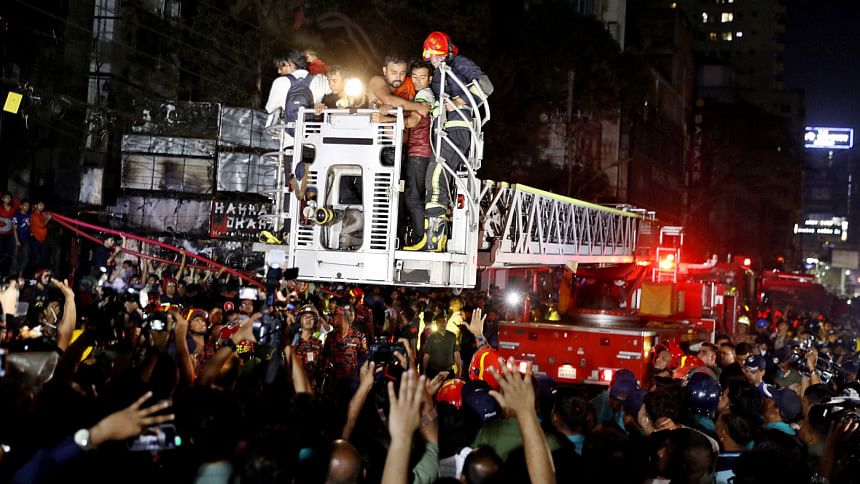Echoes of appreciation

The usual scene at Shahbag crossing often resembles the unpredictability of a game of ludo, where the traffic signal acts as the notorious big snake, swallowing travellers just before they reach their destination. As the traffic officer's cane drops, adding an extra 15 minutes to the commute, sighs of helplessness are commonplace. During one such wait, I looked out my window and found a poster on which the BIRDEM General Hospital authority thanked the Dhaka metro rail officials for making the nearby station patient-friendly. There is something refreshing about this gesture. Our culture lacks the art of thanking. We normally take things for granted. In most cases, criticism overshadows our sense of gratitude. When we need to thank someone, cats eat our tongues. But when we do give thanks, or rather feel obligated to give thanks, we end up using flattery—with our greasy motivations too glossy to be overlooked.
On Thursday morning, when I went to the bank, I found the female officers in an uncharacteristically good mood, and realised that their source of joy was the Women's Day gift boxes kept behind them. As they gathered around the gift box, capturing the moment on their phones, it became evident that it wasn't just the material gifts that brought them joy. It was the top management's genuine recognition of them and appreciation for them which lit up their faces and infused them with renewed purpose.
"Did the men get them, too?" I asked my dealing officer jokingly. "No, it's our women's day gifts." There was genuine pride in her voice. The simple act of receiving a gift had infused them with a renewed sense of purpose and determination. I looked around. Almost 70 percent of the officers were women. The purple boxes acknowledged their value and contribution to the workplace, reinforcing their importance in a male-dominated environment. In that moment, I realised the profound impact that even the smallest gestures of appreciation can have. International Women's Day gives us an occasion to annually recognise and appreciate the contributions of women in all walks of life. And sometimes, all it takes is a simple gesture of warmth and appreciation to remind them of their worth.
After the Bailey Road fire incident last week, one survivor publicly thanked the firefighter for saving her life. The sincerity with which she credited the rescue staff touched us all. Not too often do we get to hear or credit the heroism of ordinary men and women.
Yet, it is the selfless services which keep us sane in a mad, mad world. Imagine a world in which a teacher carries guns into his classes. He shoots at the leg of a student in an attempt to show off his prowess. Imagine a world in which a biology teacher at a Munshiganj madrasa cuts off the hair of nine Class 7 students for not wearing hijab. Just when you think that there is something essentially wrong in the world we live in (notwithstanding the apocalyptic reality of Gaza) and nothing to be thankful about, there comes a moment or two which allow you to appreciate life.
Asim Kumar Talukder, general manager of Bangladesh Railway (West Zone), set one such example. The 6am Rajshahi-bound Dhumketu Express, carrying about 700 Rajshahi University admission seekers, had a three-hour late start. Candidates were expected to enter their respective exam halls by 3:30pm., half an hour before the exam. When Talukder realised that the delay would jeopardise the future of hundreds of students, he personally intervened to give clearance to the train, changing the schedule of other trains. He spoke to the vice chancellor of Rajshahi University about allowing these students to enter the hall, albeit a little late. But Murphy's Law prevailed, as everything that was supposed to go wrong went wrong. At one of the stations, the train's engine failed. Talukder took the special initiative to bring in an additional engine that cost the students another half an hour. The students barely made it into the exam hall, but the coordination between the vice chancellor and the railway general manager gave these 700 students a chance to prove themselves at the highest level. They will always recall the day when two conscientious individuals made an exception for them, underscoring the principle that with great power comes great responsibility.
Our system does not usually make deviations from the norm for those deemed "ordinary." There seems to be a different set of rules for the extraordinary. The city often comes to a complete standstill in the name of security blankets. Under such blankets, ordinary men, like the racially inferior muggle-born mudbloods from the Harry Potter series, become invisible. We see through the holes in the blanket to see the powerful ones strut and fret, and we wait for them to clear the scene so that traffic can flow again. For a change, ordinary boys and girls got a taste of privilege. The acts of kindness and compassion will reverberate throughout the lives of these students. I am sure this small gesture will go a long way towards inspiring others to emulate similar acts when they join in the service of the real world.
The instances of gratitude mentioned above demonstrate the beauty of and need for cultivating a culture of empathy and responsibility. The exemplary signage of the BIRDEM officials, the gifts from the bank employers to their female colleagues, the heartfelt thanks given to the firefighter by a survivor, and the personal intervention of the railway man underscore the kind of empathy and humility we need in life in order to take a pause from the thankless rat race. The appreciation for these acts on social media proves that people are not shy about showering words of warmth when they see that service is prioritised over self-interest and power is wielded responsibly. These remarkable individuals deserve gratitude for going out of the ordinary to do something extraordinary and teaching us the beauty of empathy and integrity.
Dr Shamsad Mortuza is professor of English at Dhaka University.
Views expressed in this article are the author's own.
Follow The Daily Star Opinion on Facebook for the latest opinions, commentaries and analyses by experts and professionals. To contribute your article or letter to The Daily Star Opinion, see our guidelines for submission.


 For all latest news, follow The Daily Star's Google News channel.
For all latest news, follow The Daily Star's Google News channel. 











Comments